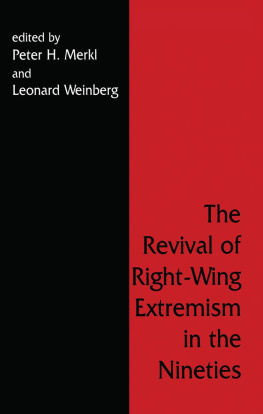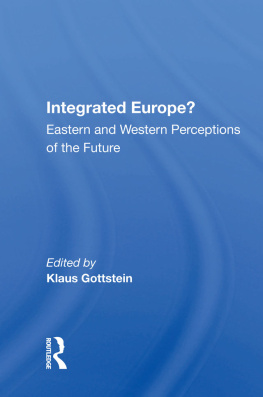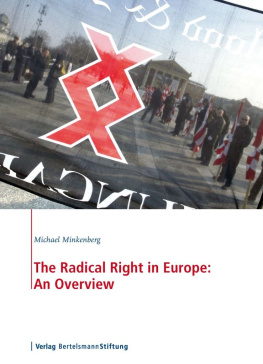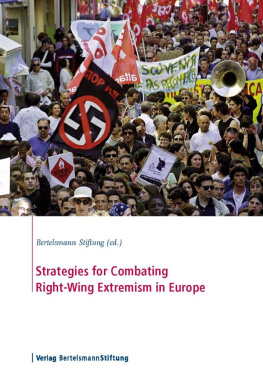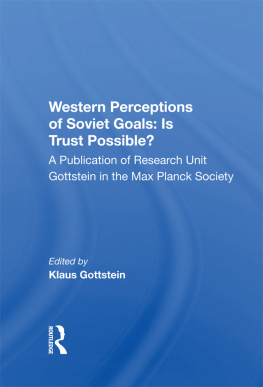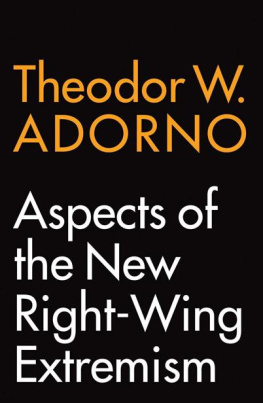RIGHT-WING EXTREMISM IN WESTERN EUROPE
Edited by
KLAUS VON BEYME
First published in 1988 by
FRANK CASS AND COMPANY LIMITED
Published 2013 by Routledge
2 Park Square, Milton Park, Abingdon, Oxon OX14 4RN
711 Third Avenue, New York, NY, 10017, USA
Routledge is an imprint of the Taylor & Francis Group, an informa business
Copyright 1988 Frank Cass & Co. Ltd.
British Library Cataloguing in Publication Data
Right-wing extremism in Western Europe.
1. Western Europe. Right-wing political movements
I. Beyme, Klaus von, 1934 II. West European politics
320.94
ISBN 13: 978-0-714-63345-9 (pbk)
This group of studies first appeared in a Special Issue on Right-wing Extremism in Western Europe of West European Politics, Vol. 11, No. 2, April 1988, published by Frank Cass & Co. Ltd.
All rights reserved. No part of this publication may be reproduced, stored in a retrieval system or transmitted in any form or by any means, electronic, mechanical, photocopying, recording or otherwise, without the prior permission of the publisher.
Contents
Klaus von Beyme
Mario Caciagli
Richard Stss
Subrata Mitra
Christopher T. Husbands
Ramn Garcia Cotarelo and Lourdes Lopez Nieto
Jrgen W. Falter and Siegfried Schumann
Klaus von Beyme is Director of the Institute for Political Science, Heidelberg University. His publications include: Challenge to Power: Trade Unions and Industrial Relations in Capitalist Countries (1980); Economics and Politics within Socialist Systems (1982); The Political System of the Federal Republic of Germany (1983); Political Parties in Western Democracies (1985); The Soviet Union in World Politics (1987); America as a Model (1987).
Mario Caciagli is Professor of Political Science (Local Government) at the University of Florence. He is the author or editor of many publications in the area of parties and elections in Italy, West Germany and Spain, such as Democrazia cristiana epotere nel Mezzogiorno (1977); Elezioni e partiti politici nella Spagna postfranchista (1986) and, most recently (with P. Corbetta), Elezioni regionali e sistema politico nazionale (1987).
Jrgen W. Falter is Professor of Political Science and Comparative Fascism at the Free University of Berlin. His research interests include electoral studies and political theory. He is a co-author of Wahlen und Abstimmungen in der Weimarer Republik (1986) and Die Entwicklung der politischen Theorie in den USA (1988). He is also engaged in the preparation of a Wahlhistorischer Atlas der Weimarer Republik (forthcoming).
Ramn Garcia Cotarelo is Professor of Political Science, University of Complutense, Madrid. His recent books are: Los partidos politicos (1985); De Estado del Bienestar, al Estado del Malestar (1986); Resistencia y desobediencia (1987).
Christopher T. Husbands is a Senior Lecturer in Sociology at the London School of Economics and Political Science. He is the author of Racial Exclusionism and the City: The Urban Support of the National Front (1983), the co-author (with Patrick Dunleavy) of British Democracy at the Crossroads: Voting and Party Competition in the 1980s (1985), and he has written extensively on the extreme right in Britain and Western Europe. He is now completing a book entitled Racist Political Movements in Western Europe.
Subrata Mitra lectures in Comparative and Indian Politics at the University of Hull. He has also taught and held research posts at the Centre for the Study of Developing societies, Delhi; the Maison des Sciences de lHomme and the French Institute of Public Opinion. His publications include: Governmental Instability in Indian States (1979) and Citizens Participation in Rural Development (1982)
Lourdes Lopez Nieto lectures in political science at the Complutense University, Madrid. She has written on various aspects of Spanish parties and elections, and her most recent book is Alianza Popular, 19761982 (1988).
Siegfried Schumann is an Assistant Professor at the Centre for Social Research, Free University of Berlin. His research fields are concerned with political culture and voting behaviour. He is the author of Politische Einstellungen und Persnlichkeit (1986) and Wahlverhalten und Persnlichkeit (forthcoming).
Richard Stss is a lecturer in the Department of Political Science at the Free University of Berlin, specialising in the study of political parties. His publications include: Vom Nationalismus zum Umweltschutz (1980), and he edited the Parteien-Handbuch: Die Parteien der Bundesrepublik Deutschland, 19451980 (two volumes, 1983/84).
Klaus von Beyme
CONTROVERSIES OVER CONCEPTS
Since the nineteenth century a host of party typologies have been developed. This kind of research included efforts to find four or five factors defining the difference between the moderate and the extreme right. In the nineteenth century extremists on the right of the political spectrum were frequently called reactionaries. The concept of conservatism cannot easily be described by rationalistic definitions and refuses to pose as just another ism. The Pope on his return to Rome in 1814 outlawed all street lighting because it was in his view a revolutionary innovation.1 In stating this opinion he gave a remarkable definition of what conservatism wants to avoid. Conservatism is, however, not necessarily opposed to change. Modern right-wing extremism, though frequently called reactionary, may have a quite progressive social programme. The Fascist regimes in Germany and Italy became the most violent rationalistic modernisers of their respective countries in spite of ideological commitments to an organic society.
Modern definitions of right-wing extremism are still based on the traditional criterion for differentiating between conservatives and reactionaries: conservatives try to maintain the status quo, right-wing extremists want to restore the status quo ante. A second criterion has been added, however: the envisaged restoration may, if necessary, be achieved by the use of force. This latter criterion may be better applied to fascism and neo-fascism than to traditionalist reactionary movements. The commitment of right-wing extremists to the status quo ante can, however, be called into question. In Weimar Germany the movement called conservative revolution was the first right-wing political formation which did not simply want restoration. It was neither clerically-oriented nor very traditional in its social ideas, and certainly not interested in the restoration of the Hohenzollern monarchy.2 The ideas of the conservative revolution seem to have played a greater role in France than even certain French precursors of right-wing thought. Germany was a latecomer with regard to the production of this type of ideology. Among the revolutionary right in France a kind of prfascisme had developed, based on attitudes which remained similar from Barrs to Maurras.3
Other frequently used criteria for labelling fascist and neo-fascist movements (ethnocentrism, anti-pluralism, anti-individualism, hyper-nationalism, missionary attitudes and so on) also cause problems, because a good many neo-conservative groups (at least outside America, where the ideology of the market society is stronger than in Europe) share these values. Since the concept of a free enterprise economy has been given a central place among the few constant elements of the conservative credo4, and since its high esteem has even been accepted by some right-wingers, the authoritarian elements of the right-wing credo have been smoothed over, and the dividing line between conservatives and right-wing extremists has become even more blurred.




